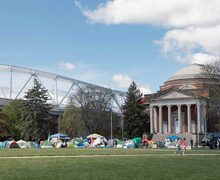Body of proof: Fox Valley Technical College builds facility for forensic study of corpse decomposition
Natalie Riess | Art Director
Crime shows like “CSI” and “NCIS” often feature storylines where bodies are found in places like forests or cars parked on the side of a remote road. The officers and scientists in the show spend the episode determining the cause of death and tracking down the murderer.
Now, researchers at Fox Valley Technical College in Wisconsin are building a facility to help real crime scene investigators do those things, too.
The college is in the process of opening its Public Safety Training Center in January 2015, which will primarily be used for classes, manager of media relations Chris Jossart said in an email. The training center will incorporate a forensic training field, which is an outdoor area where researchers place human and animal cadavers in various settings to research how the bodies decompose.
“We oftentimes find folks days, weeks, months, years after they’ve died and so there’s a lot of questions that we need to answer as related to how long they’ve been dead and what did actually cause them to die,” said Joe LeFevre, chair of Fox Valley Technical College’s forensic science program. “So, by doing decomposition research, we can see the changes.”
LeFevre said that although similar facilities exist across the country, the Fox Valley center offers unique conditions. No facility in the country has temperatures similar to Wisconsin’s climate, and so other facilities can’t do research on bodies in these temperatures.
“What police officers in our states are seeing doesn’t jive with the data that comes from Tennessee,” LeFevre said, referring to a facility at the University of Tennessee Knoxville that he says was the first of its kind.
LeFevre said the research facility, which is separate from the training center, is still under construction and will probably open in the summer of 2015. Students will have very limited access to the facility because Wisconsin makes a distinction between the role of technical colleges and research institutions.
Students at Fox Valley train for specific professions and do not focus on research. Students will, however, have access to data collected from the experiments. LeFevre said Fox Valley has a unique system that combines academics and hands-on skills into an associate degree.
“They walk out the door with two pieces of paper: an actual college degree and a state academy certification, so that makes them very hirable,” he said.
Fox Valley is talking with other research universities about partnering to publish research, LeFevre said.
Jossart said the forensic training field would be “just part of a larger facility that is being built for the betterment of training concerning a variety of public safety disciplines.”
LeFevre said these new facilities will help enhance public safety education at Fox Valley. He said the school will be able to do double training, so that new recruitment training and in-service training can happen at the same time.
Said LeFevre: “Up until this building opens, we could only do one or the other and so there was always that constant juggle of trying to get the recruits through their basic training, but yet also getting officers and firefighters in service back to get their continuing education to keep their certifications.”
Published on April 10, 2014 at 12:56 am
Contact: [email protected]




